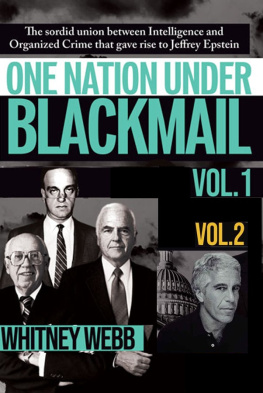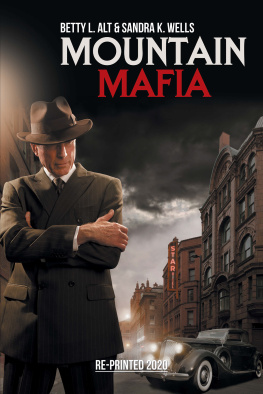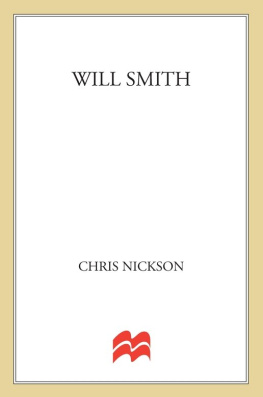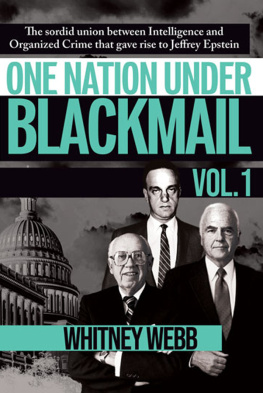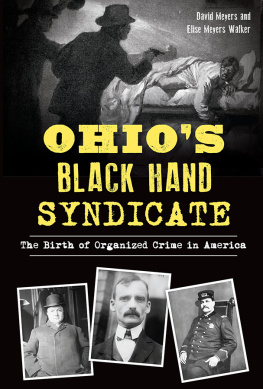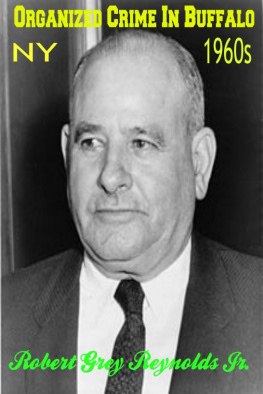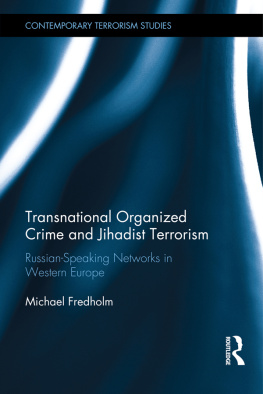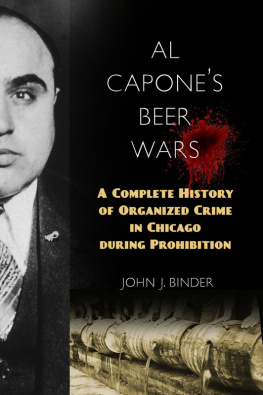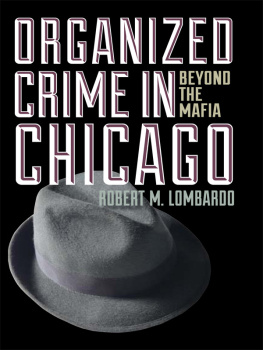The publisher and the University of California Press Foundation gratefully acknowledge the generous support of the Richard and Harriett Gold Endowment Fund in Arts and Humanities.
University of California Press, one of the most distinguished university presses in the United States, enriches lives around the world by advancing scholarship in the humanities, social sciences, and natural sciences. Its activities are supported by the UC Press Foundation and by philanthropic contributions from individuals and institutions. For more information, visit www.ucpress.edu.
University of California Press
Oakland, California
2019 by Chris M. Smith
Library of Congress Cataloging-in-Publication Data
Names: Smith, Chris M., author.
Title: Syndicate women : gender and networks in Chicago organized crime / Chris M. Smith.
Description: Oakland, California : University of California Press, [2019] | Includes bibliographical references and index. |
Identifiers: LCCN 2018057020 (print) | LCCN 2018059706 (ebook) | ISBN 9780520972001 (e-book) | ISBN 9780520300750 (cloth : alk. paper) | ISBN 9780520300767 (pbk : alk. paper)
Subjects: LCSH : Organized crimeIllinoisChicago20th century. | Female offendersIllinoisChicago20th century.
Classification: LCC HV 6795. C 4 (ebook) | LCC HV 6795. C 4 S 65 2019 (print) | DDC 364.106082/0977311dc23
LC record available at https://lccn.loc.gov/2018057020
Manufactured in the United States of America
28 27 26 25 24 23 22 21 20 19
10 9 8 7 6 5 4 3 2 1
Heroines of the booze mobs, the gun-molls of a cock-eyed era labeled prohibition, some day may emerge as a composite, legendary figure in literary form worthy of becoming a prominent part of American folklore. This epic gun-moll will be the modern Maid Marian of rollicking songs in which her man, the hero, will be an amazing character, pictured as pirate, gorilla, and great lover, rolled into one. The story will tell how the heros machine guns mowed down enemies like blades of wheat before a sickle until, one day, he was taken for a ride. At this point the gun-moll will take the spotlight in a finale of tears, wailing before an officious but future person labeled law.
JOSEPH U. DUGAN , Gang Women of Dry Era Bid
for Spurious Fame, Chicago Daily Tribune,
December 31, 1933, G3.
Acknowledgments
Writing a book does not take a village. It takes a social networkespecially a social network of durable professional and personal ties. First and foremost, I thank Andy Papachristos for his incredible mentorship, investment, training, creativity, sense of humor, and support. We bond over being first-generation college students, cool finds in the archives, naming computers, and fun academic writing. Social ties predict outcomes, and Andy made the process from research assistant to dissertation to book fun, engaging, fruitful, and inspiring. The first time I met Andy, I was working in the graduate computer lab during my first few weeks of graduate school. He asked me why I was not enrolled in his social networks graduate course. I told him that I didnt know what social networks were. That was over a decade ago.
Don Tomaskovic-Devey has a high degree of mentorship ties to some of my favorite sociologists. I am fortunate that Don shared his relational resources, friendship, and mentorship with me. Theoretical orientations for books do not usually come directly from your mentor, but I also get to thank Don for his work on relational inequality and pushing me to engage these hard, theoretical questions even days before my deadlines. Bob Zussman thinks creatively and relationally. He convinced me that there was something in this research topic when I could not see it, and he continued to help me to see it. Jen Froncs period expertise, historians voice, and writing inspired me to not neglect the historical narrative. It has been a pleasure and an inspiration to work with these four intellectual giants.
I thought publishing a book was going to be difficult, but my experience with the University of California Press has only been supportive. Maura Roessner was on board within six days of my sending the proposal and sample chapters. Mauras enthusiasm for the project and our meetings kept me motivated. I had the most encouraging and detailed set of reviews from Vanessa Panfil and Carlo Morselli. Whenever I felt stuck, I returned to their comments to remind me what the book was about and how to make it better. Lindsey Halsells detailed copyediting and encouraging commentary got me through the last few weeks of preparing the manuscript. Thank you, Sabrina Robleh and Madison Wetzell, for keeping the project organized.
University of Massachusetts Amherst Sociology is a dense section of my social network full of amazing people. I owe many thanks to Beth Berry, Roland Chilton, David Cort, Christin Glodek, Rob Faulkner, Naomi Gerstel, Sanjiv Gupta, Sandy Hunsicker, Janice Irvine, James Kitts, Jen Lundquist, Karen Mason, Joya Misra, Wenona Rymond-Richmond, Laurel Smith-Doerr, Millie Thayer, Barbara Tomaskovic-Devey, Maureen Warner, Wendy Wilde, and Jon Wynn. UMass Sociology became increasing multiplex through friendships with fellow graduate students. Thank you, Dustin Avent-Holt, Irene Boeckmann, Laura Heston, Missy Hodges, Ken-Hou Lin, Elisa Martinez, Sarah Miller, Tim Sacco, Mary Scherer, Eiko Strader, Mahala Stewart, Shawn Trivette, and Ryan Turner. Melinda Miceli was my broker to UMass, and I thank her for my introduction to sociology at the University of Wisconsin-Eau Claire, mentoring me through graduate school applications and encouraging me to apply to UMass, and for friendship throughout the years.
The Sociology Department at the University of California, Davis, contributed to the intellectual fine-tuning of this book and provided me with letters of support, mentorship, manuscript workshops, and general good cheer. Many thanks to Sondra Byrd, Sheline Calvert, Angela Carter, Courtney Caviness, Orly Clerge, Max Craig, Bob Faris, Ryan Finnigan, Jess Gold, Ryken Grattet, Erin Hamilton, Jacob Hibel, Jonathan Jordan, Jared Joseph, Jacque Leaver, Val Ludovina, Bill McCarthy, David McCourt, Stephanie Mudge, Rachel Nickens, David Orzechowicz, Caitlin Patler, Zach Psick, Kim Shauman, Vicki Smith, and Matt Thompson. Bill McCarthy read the manuscript in its entirety and gave me the exact level of feedback that I needed just before the final summer of writing. Ryken Grattet wrote multiple letters of support and encouraged my writers voice. Bill and Ryken pushed me to think more critically about co-offending and legal ambiguity, and their research inspired large portions of my revisions. I received excellent research assistance from UC Davis undergraduates Cierra Bordwine, Liann Tucker, Johanna Vega, and Lauren Wong. My engaging students from the spring 2018 Gender & Crime seminar showed me how accessible and exciting this work was for the undergraduate classroom.
My broader intellectual community includes Nicky Fox, Katherine Irwin, Rory Kramer, Andrea Leverentz, Sam Mitrani, Carlo Morselli, Jonathan Obert, Vanessa Panfil, Brianna Remster, Tim Thomas, Garen Wintemute, Katie Young, and Marjorie Zatz, who all have talked with me about this project, Chicago history, gender and crime, and book publishing over the years. Your work and our conversations continue to inspire me.




